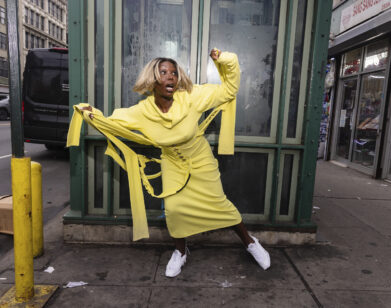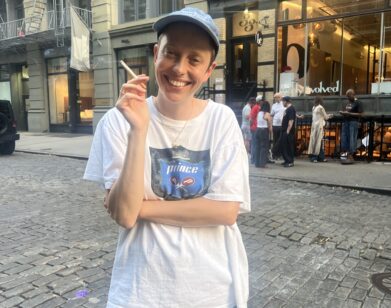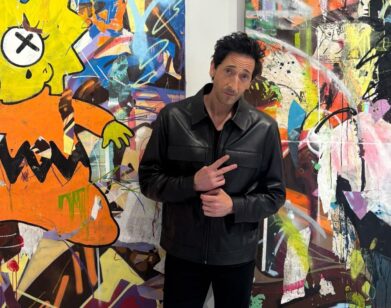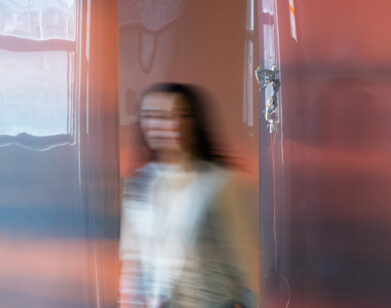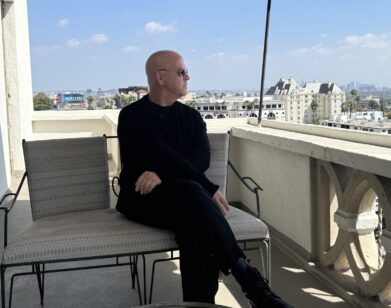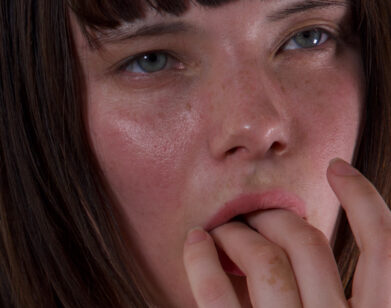OPENING
In Her New Show, Painter Amanda Wall Eroticizes Her Favorite Subject: Herself
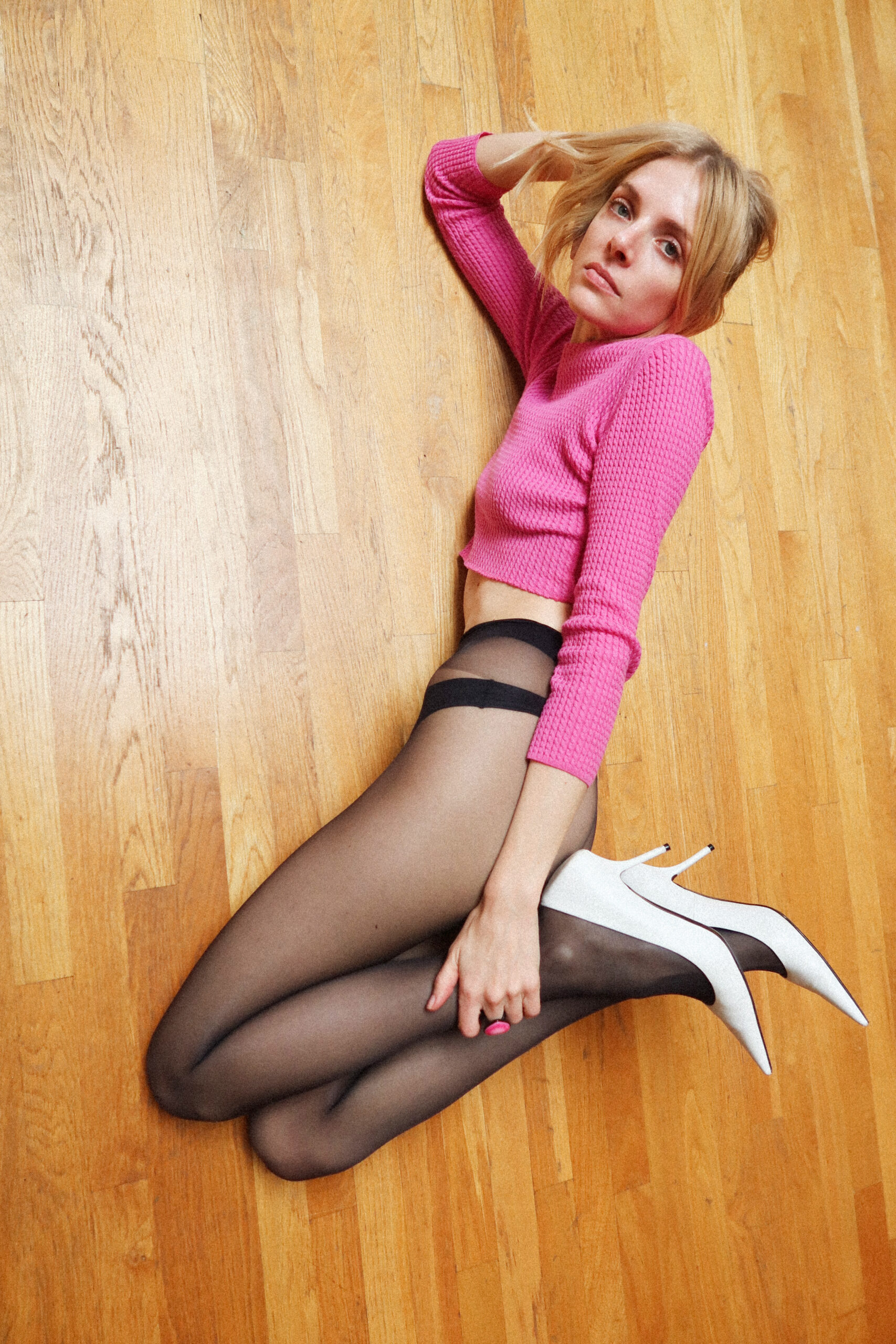
Amanda Wall, photographed by Dana Boulos.
“I think men are trying to destroy paintings,” says art critic, photographer and editor-in-chief of Purple Magazine Olivier Zahm. “Men are trying to destroy everything all the time,” replied painter Amanda Wall, who’s new solo exhibition Sky got dark, opening tonight at Almine Rech, explores bodily autonomy and auto-erotism as “an appropriation of self,” as the artist explains. Her fleshy, garish portraits draw from a series of self-shot iPhone photos of the model, in her own words, “tragically flailing around” at home. Her proportions playfully distorted as rendered on canvas, Wall exaggerates and restricts different assets to create an uncomfortable and at times unnerving take on the female form. Before her show, the self-taught artist sat down with Zahm (who also happens to be her ex-boyfriend) to talk about the power in projecting yourself as a sexual figure, growing up day-dreaming in rural Oregon, and getting thrown into the hot center of the art world.
———
OLIVIER ZAHM: Hello, Amanda.
AMANDA WALL: Hi. Good morning.
ZAHM: You have your first New York show.
WALL: I do. Not this morning, though. What are you doing? You’re in Paris in your office?
ZAHM: Yes, I’m working on the next issue of Purple, and I’m ready to go to a dog show organized by a friend of mine at M/M Gallery in Paris. It’s a show about dog and they’re waiting for–
WALL: About dogs?
ZAHM: About dogs, yes.
WALL: Okay. You’re so obsessed with dogs now. This is a whole new thing. I didn’t know this about you, that you had this capacity or this empathy for–
ZAHM: I didn’t know that about myself either.
WALL: But now you adopted one.
ZAHM: Yes. It’s really fun. It’s changed my life. It’s a permanent companion.
WALL: You never had one as a child?
ZAHM: I had a dog, but a big dog. And I didn’t like it so much.
WALL: That’s some sort of alpha competition or something. You need a small pet.
ZAHM: Speaking of dogs, you live in a very solitary city.
WALL: Yeah.
ZAHM: How do you embrace this solitary life? I guess it’s perfect for an artist like you.
WALL: It is. I’m a solitary person outside of Los Angeles. In a new city, I find myself just hiding in my apartment, or hiding a lot. I’m fairly autonomous. I grew up in the woods as an only child, and I had a way of learning to deal with the world alone.
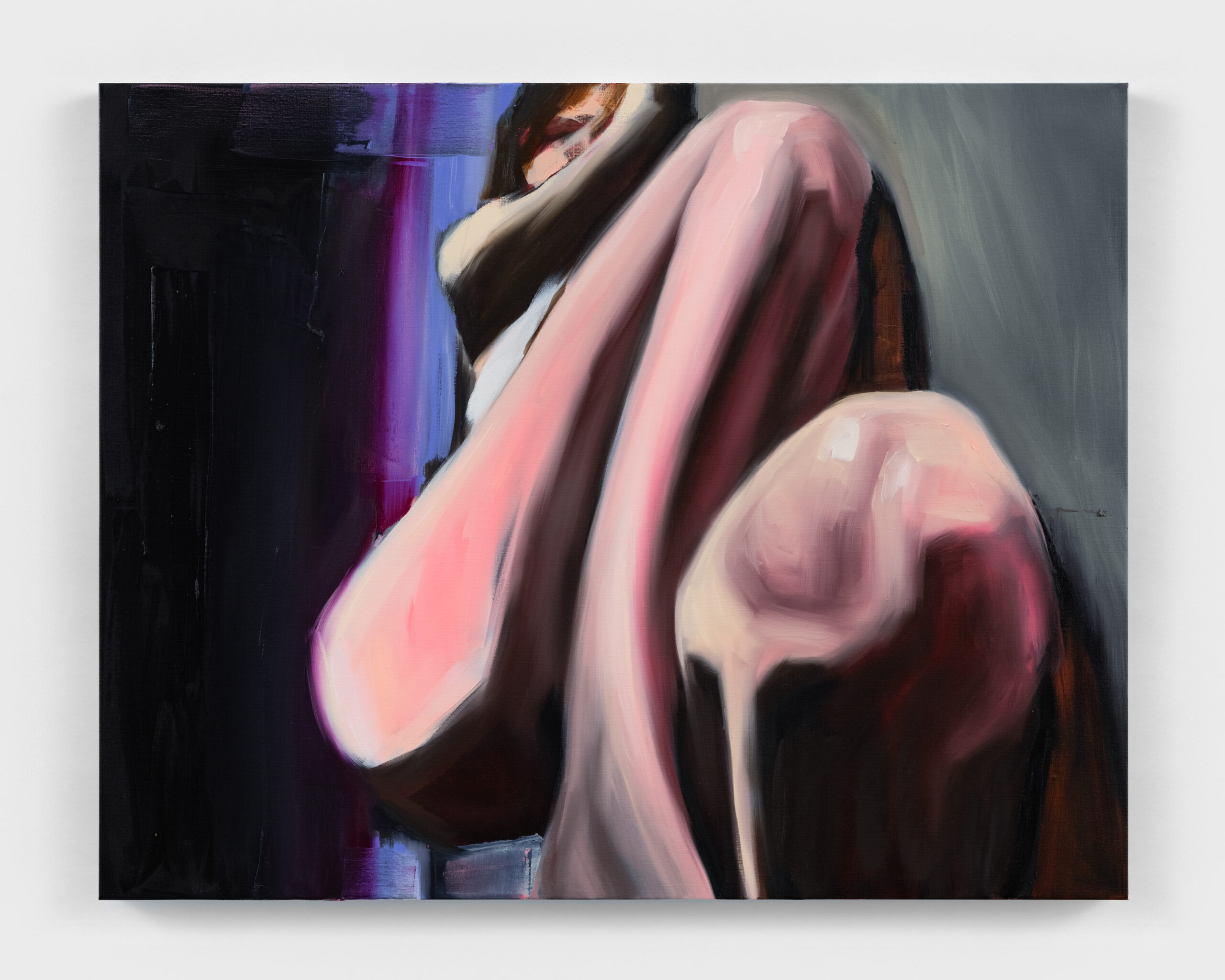
Glycine, 2024. Oil on linen. 40x50x11/2in. Photo by Charles Roussel.
ZAHM: As in the woods of Portland, Oregon?
WALL: Yeah, you’ve been.
ZAHM: How would you describe this place? Because people don’t know so much about Portland.
WALL: Well, I wouldn’t say I’m from Portland. I’m from a small town, very redneck. I grew up white trash in a place that was just trees and mountains, before the internet, in a house that didn’t have books in it. I don’t know, it was a very free childhood, but very limited in terms of culture.
ZAHM: Yes, but it’s very important to have a childhood with no distractions because you can dream or create your own world. If you’re constantly solicited or captured by information and entertainment like young kids are today, you don’t think about your life.
WALL: Do you think you’ve thought about your life as a child? Were you distracted?
ZAHM: I spent five years outside of Paris because my parents forced me to go to the countryside. I couldn’t stand it, but it was good. I remember thinking a lot about what I wanted to be, who I wanted to be, what I wanted to do. It is very important to be bored when you’re a child.
WALL: Yeah, because you create things.
ZAHM: Exactly. This is where you start to be an artist in your head.
WALL: Absolutely. I was constantly making things. That’s all I did in my room alone. I wasn’t really painting, and I don’t know if that had to do with inaccessibility to art supplies, which are expensive, and we didn’t have a lot of money, but I was making films a lot. I loved the camcorder. It was VHS type, and I would get the neighbor girls over and create these settings. Or even just doing stop-motion animation with toys in my room, I really loved that.
ZAHM: I’ve seen you very emotional or very touched to look at the videos that your mother–
WALL: Oh, the old family tapes?
ZAHM: Yes, that you were a part of and that you were maybe acting in? Because from what I could tell in these videos, your mother had a very high idea about you. She pictured you as a superstar already.
WALL: That’s not false. I was the star child. The all-singing, all-dancing star.
ZAHM: So you had to conform with this dream of your mother.
WALL: It’s funny, because I feel like it wasn’t that. I had a cousin who was in beauty pageants and had to do all of that bullshit, and I don’t feel like I had to do anything so extreme. But it came from a place of her wanting me, as every parent does, to have the life she couldn’t have or something. She got pregnant when she was 17 and was a mother her entire life, so she looked for any opportunity for me to escape that, whether it was ballet classes or piano or any kind of extracurricular.

Poet, 2024. Oil on linen. 50x60x11/2in. Photo by Charles Roussel.
ZAHM: So you were raised as a little future star in a very solitary, white trash environment?
WALL: It seems like they don’t go together, but somehow it worked.
ZAHM: And beautiful nature with a scary side because it’s not far from Twin Peaks–
WALL: Oh, it’s incredibly Twin Peaks. My dad worked at the lumber mill. It was very small-town America: woods culture, prom queen, football star, all of that bullshit.
ZAHM: Yeah, because there’s a scary part of this big nature in Oregon. It’s very grandiose and you feel alone and that you can at any moment disappear there.
WALL: That’s your perspective of feeling safe in a city. I feel more safe away from people. But you were just in Scotland, and don’t you think it’s similar?
ZAHM: Yes, but the nature there looks more like the historical background of a Middle Ages story. You can still feel the violence, the cruelty, the energy of that life.
WALL: You can feel my people.
ZAHM: Yes. I understand why they drink whiskey, because it’s so cold. If you don’t have a glass of whiskey at six o’clock, your life is really miserable. But you’ve never been attracted to New York? I mean, the destination for you was L.A., not New York, right?
WALL: Of course. I love driving cars. I love not being around people. New York is fun for a few days, but it’s so exhausting to me. I’m so introverted, and you’re constantly bombarded by humans in a way that doesn’t really work for me.
ZAHM: But isn’t it more stimulating as an artist?
WALL: It’s too stimulating. I last a week and then I’m done. There’s external stimulation and there’s internal perspective stimulation. That’s where my work comes from.
ZAHM: So what is a typical day for you in L.A.? Waking up, going straight to the studio?
WALL: Yeah. I’m not really a morning person. This is still pretty much morning for me. I go to the studio, I’m there, see what happens. I paint or don’t paint. I’ve learned to not force myself to paint when I don’t feel like it. How I got into painting was really a zero-to-60 feeling. I was alone in my apartment making paintings and then suddenly I was on the art scene and I had to learn how to paint very quickly. So I’ve forced myself to paint in situations that I wouldn’t have in the past, which was beneficial.
ZAHM: You found a perfect subject to paint, which is an enigma to me, a mystery to me. It’s yourself.
WALL: Exactly.
ZAHM: Who is Amanda Wall?
WALL: That’s a mystery to you, specifically.
ZAHM: Yes, because you’re a very secretive person. You keep your life very difficult to access. You don’t say anything about yourself, and then you are the subject of your painting. It’s a funny jump from hiding yourself to being an obsessive subject of your painting.
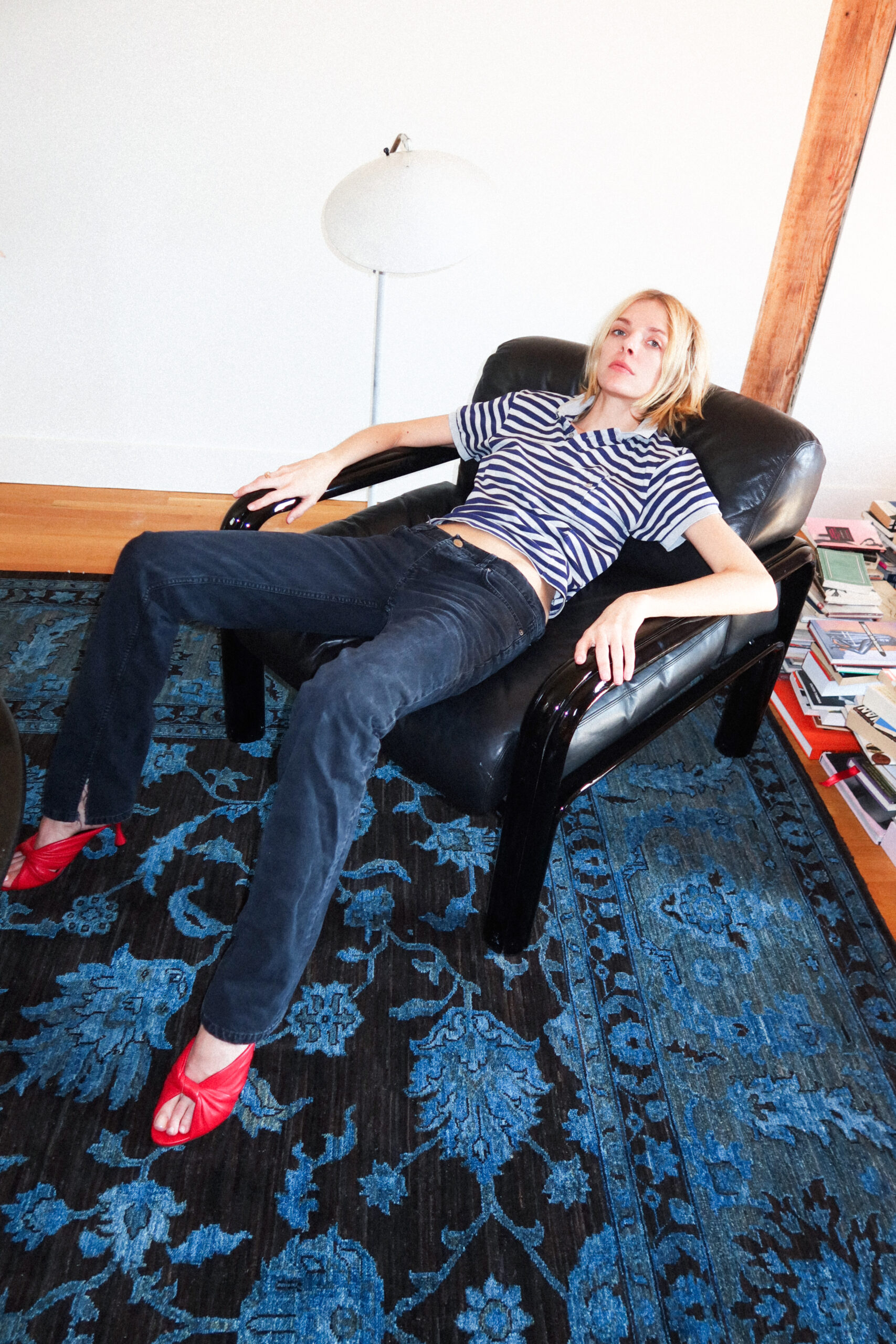
Amanda Wall, photographed by Dana Boulos.
WALL: I don’t know how to address that.
ZAHM: But it’s clearly you in the painting.
WALL: It is me.
ZAHM: Sometimes there’s a few friends.
WALL: I’ve done less of that now. I’ve narrowed it down to just using myself. It’s a bit easier. If it feels better, it makes more sense.
ZAHM: To me, it’s a good idea to express yourself in your own subjective way. And it’s not a very flattering expression of yourself.
WALL: No, it’s not.
ZAHM: Sometimes the paintings are really scary. Sometimes they are too scary.
WALL: They’re mostly scary. Generally in terms of painting, even outside of myself, I’m not really interested in beautiful paintings. I like things that are a bit more uncomfortable, a bit more awkward, more of a reflection of my perspective on reality.
ZAHM: But beside being a self-portrait of yourself, what do your paintings address as a topic? Do you question something? To me, I think you question sexuality today. I believe that sexuality is very difficult to represent today. One of the most obvious reasons is that sexuality has been, because of pornography, seen everywhere. People are tired of sexuality. It’s not transgressive anymore, it’s not liberating anymore. It’s boring for people.
WALL: It’s more of an eroticism of self than an actual sexuality. There’s no sex act happening in the paintings. There’s no real actual nudity. You see asses, but that’s a universal thing.
ZAHM: There’s no sex act, but there’s a sex appeal.
WALL: There’s a solitary sex. A solitary, autonomous sex.
ZAHM: Yeah, because it starts with you taking a picture of yourself.
WALL: I do, yeah. It’s eroticism of self, or it’s this disillusionment of the boundaries of self that become this erotic thing.
ZAHM: So too much sexuality and we end up with a self-sex?
WALL: Or no sex.
ZAHM: No sex.
WALL: No sex and no sex.
ZAHM: And how do you take the pose in front of your camera?
WALL: I’m generally just rolling around on the ground with my phone. The self-timer mode is very helpful for that. It’s easier to use myself than other people, because I’m oddly flexible. When you’re shooting other people, you can feel that they’re more uncomfortable or they’re more self-aware in the way that I can take a photo of myself that doesn’t have that. In a way, it’s a performance piece that’s ongoing, I would say.
ZAHM: You should videotape your photo session.
WALL: That’s embarrassing. I have all the photos. I reference photos from all my paintings of me just tragically flailing around.
ZAHM: But you have a good style, you have a sense of fashion, and I think that goes also into your paintings. You introduce some accessories, some shoes.
WALL: That’s a problem. As soon as I added clothes to them, people were like, “Oh, they’re fashion paintings.” And I’m like, “They’re not fashion paintings. I just have great style and I can’t not put it in there.”

Mouthfull, 2024. Oil on linen. 24x20x11/2in. Photo by Charles Roussel.
ZAHM: People are not wrong, because there’s a sense of fashion in the pose, in some of the accessories, sometimes also just the atmosphere. I wanted to say that you have a very good technique for painting the skin.
WALL: I think I’m getting better. But that’s the problem with getting better at painting. The second something gets to be too good or too beautiful, I want to distort it or destroy it, because it’s not an interesting perspective for me anymore.
ZAHM: No, because the mystery of painting goes a lot with the mystery of the surface. I think it’s Nietzsche who said, “The deepest is the surface,” something like that. In French, we say, “The deepest thing is the skin.” And in the painting, the skin is really mysterious. It’s incredible because it’s nothing compared to photography. It’s connected with a certain truth that a photo can’t capture. You’re on this track of walking obsessively on the surface of the skin, of the hair, of the eyes, of the ass, of the feet, and you make us feel that everywhere, everything is there.
WALL: But that’s a reflection of the present.
ZAHM: To me, it’s the magic of painting. I believe that every picture of you, even though it’s only about you, expresses this quality of the painting itself to connect us with the surface, our own surface, our body, much more than any photo. It’s very difficult in photography. It’s easier in film photography than in digital photography, because digital is already dead. When you paint yourself, you re-create reality. Even though you start from a picture, it’s a total creation. And this creation has an impact on the mind because it’s purely, deeply human, or deeply true. This is why I believe that it’s a very good idea to become a painter today. You make the right choice because–
WALL: I made the right career choice? Good.
ZAHM: I’m very curious about your next show, by the way. Thinking that you were working for the New York public, did it change your work?
WALL: It didn’t change my work, but it gave me a lot more anxiety. I can’t change the work. I can have an idea of what a painting will be, and it will never turn out that way. I can have an idea of what the show will be, but once I get there and get to the studio, you have to surrender to the painting itself.
ZAHM: Okay. And do you have a title for this new show?
WALL: Yeah. It’s called Sky got dark.
ZAHM: Sky got dark?
WALL: It did.
ZAHM: Not only the sky, by the way.
WALL: So many things.
ZAHM: But I think you’re happier than before.
WALL: Before what?
ZAHM: Before. I refer to the time I used to know you.
WALL: Oh, right. Is this where we enter into couples therapy? I’m just as dark, I just manage it better.

Tights Purple Sky, 2024. Oil on linen. 24x20x11/2in. Photo by Charles Roussel.
ZAHM: And do you think you will have the energy and the patience and the strength to paint all your life? It’s just the beginning.
WALL: I can’t even imagine a whole life, so I can’t imagine what I would be doing. I’ve been painting for five years, three years very seriously. I’m very exhausted right now. I need to take a break for a minute after this.
ZAHM: Is Richard Prince still your favorite painter?
WALL: I love Richard Prince, not only his paintings, just his whole shit too. There are many painters that I like. I would even say Paul McCarthy is an inspiration for painting, even though he’s not known as a painter. I like that generation of painting. We’re in a new space now, it’s a lot of women painters. It’s a different scene, so I’m just nostalgic for a past thing that I didn’t have access to. I don’t know who’s my favorite painter at the moment.
ZAHM: It’s very interesting that there’s a whole new generation of women painters, and you’re part of them, because they open painting to different possibilities that men basically took over. The girls and you took over and reintroduced everything in it and made it joyful, surprising, surrealist, funny, and sexual again, with no fear.
WALL: It’s funny you say sexual too, but I feel like even men were not allowed to sexualize things for a period. It wasn’t a good look, to sexualize a female. So I think we had that power to sexualize ourselves in a way.
ZAHM: Exactly. And represent yourself, represent your identity, and work with your identity on the canvas.
WALL: Well, it wasn’t an appropriation of a female form. It was an appropriation of self.
ZAHM: I think men are trying to destroy paintings.
WALL: Men are trying to destroy everything all the time.

